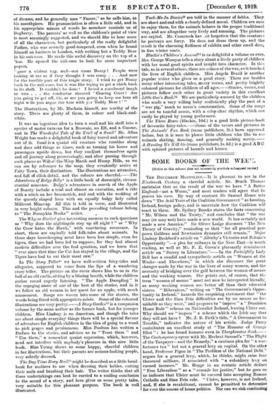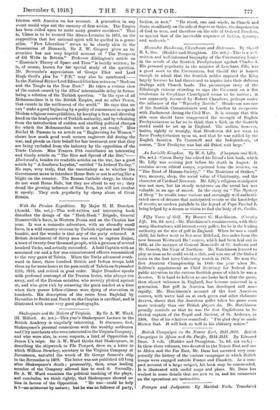SOME BOOKS OF THE WEETT.
[Notice in this column does not necessarily 'ream& subsequent review.] THE DECEMBER MONTHLIES.—It is pleasant to see in the Nineteenth Century a cheerful article. Mr. Beach Thomas maintains that as the result of the war we have " A Better England—not a Worse," and most readers will agree that he proves his case. By way of contrast Sir Samuel Hoare sets down " The Acid Tests of the Coalition Government " as housing, Ireland, foreign policy, and is uncertain how the Coalition will react to them. Mr. Sydney Brooks states the facts concerning " Mr. Wilson and the Treaty," and concludes that " the war may (or may not) have made a new world. It has certainly not made a new America." Sir Oliver Lodge discusses " The New Theory of Gravity," reminding us that " for all practical pur- poses Galilean and Newtonian dynamics still remain." Major Lindsay Bashford's article on " Allenby's Victories and Britain's Opportunity "—a plea for railways in the Near East—is worth reading, as well as Mr. F. E. Green's pleasantly reminiscent article on " Surrey in Literature."—In the Fortnightly Lady Bell has a candid and sympathetic article on " Women at the Works—and Elsewhere," in which she discusses the great changes made by the war in the lives of many women, and the necessity of bridging over the gulf between the woman of means and the working woman. She points out, of course, that the term " woman of means " must not now be interpreted literally, as many working women are better oil than their educated sisters. " Hibernicus," writing on " The Government's Oppor- tunity in Ireland," hazards the surprising statement that " the Ulster and the Sinn Fein difficulties are by no means so for- midable as they were," and proposes to " impose " a " Dominion Home Rule" scheme on Nationalist Ireland, leaving Ulster out. Why should we " impose " a scheme which the Irish say that they will not have ? Mr. J. B. Firth's title, " A Government in Trouble," indicates the nature of his article. Judge Parry contributes an excellent study of " The Humour of George Eliot " : he has found humour even in Theophrastus Such.— The Contemporary opens with Mr. Herbert Samuel's " The Plight of the Taxpayer—and the Remedy," a cautious plea for " a war- fortunes tax " but not a general levy on capital. On the other hand, Professor Pigou in " The Problem of the National Debt " argues for a general levy, which, he thinks, might raise four thousand millions, if associated with " a subsidiary levy on earned incomes." Mr. Hogge in an ecstatic article defines " Free Liberalism " as a " crusade for justice," but he goes on to indicate that Ulster must be coerced into accepting Roman Catholic and Sinn Fein rule. " Ulster, however, is not Ireland, and, if she is recalcitrant, cannot be permitted to determine for ever the course of home politics. Nor can we risk continuing
friction with America on her account. A generation in any event would wipe out the memory of firm action. The Empire has been called upon to make many greater sacrifices." That is, Ulster is to be treated like Alsace-Lorraine in 1871, on the supposition that her national spirit will be quelled in a gener- ation. " Free Liberalism " seems to be closely akin to the Prussianism of Bismarck. Sir J. W. Gregory gives an in- structive but not very hopeful account of " The Prospects of Oil Wells in Britain." Professor Eddington's article on " Einstein's Theory of Space and Time " is lucidly written ; he is, of course, known for his special study of the question. Mr. Seccombe's appreciation of George Eliot and Lord Hugh Cecil's plea for " P.R." may also be mentioned In the National Review Lord Edward Gleichen writes on "Moslems and the Tangle hi the Near East." Ho takes a serious view of the unrest caused by the Allies' interminable delay in formu- lating a solution of the Turkish question. " In the eyes of all Mohammedans it is the British Empire, and no other Power, that counts in the settlement of the world." He says that we can " make a good beginning by a policy of reassurance as regards Moslem religious susceptibilities, by keeping a firm and directing hand on the headquarters of Turkish authority, and by refraining from the introduction of sudden and startling political changes for which the Mohammedan world is not yet ready." Miss Itichel M. Parsons in an article on " Engineering for Women " shows how much good work women engineers did during the war, and pleads on their behalf for fair treatment now that they are being excluded from the industry by the opposition of the Trade Unions. Miss Frances Pitt contributes an interesting and timely article on " The Rise and Spread of the Rat." Blackwood's, besides its readable articles on the war, has a good article by " A Southern Loyalist," entitled " In Ireland To-day." He says, very truly, that the uncertainty as to whether the Government mean to introduce Home Rule or not is acting like a blight on the country. The Roman Catholic clergy, he thinks do not want Home Rule, but they are afraid to say so ; they dread the growing influence of Sinn Fein, but will not combat it openly. They seek popularity by cheap abuse of Great Britain.















































 Previous page
Previous page